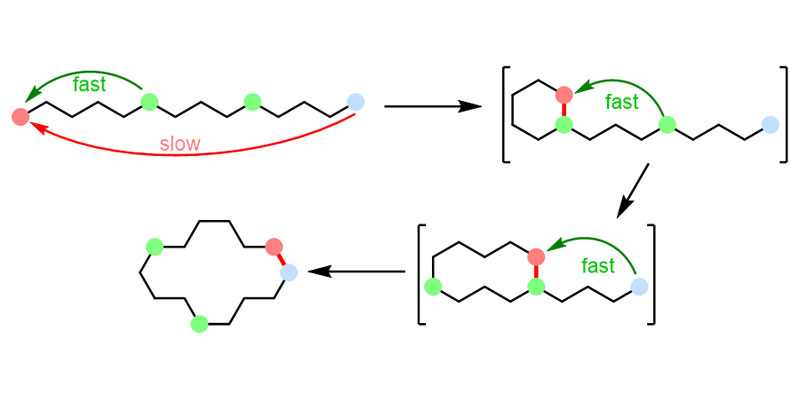Expanding Macrocycle Chemistry
Posted on Wednesday 28 February 2024

The cyclic molecules – known as ‘macrocycles’ – are molecules arranged in large rings. Naturally occurring macrocycles are very important in medicine, most notably to treat cancer and bacterial infectious diseases. However, practical methods to make macrocycles are limited, thus limiting our ability to explore fully synthetic macrocycles as potential new treatments for disease.
Dr Will Unsworth and his research team set out to use their expertise to develop new and improved method to make medicinally important macrocycles.
Their method is based on the use of cascade reactions – processes which combine multiple chemical reaction steps into a single operation (see Figure). More specifically, they developed a reaction system in which end-to-end cyclisation – a notoriously slow and difficult chemical reaction – can be broken down in a series of faster and easier cyclisation steps, enabled by rearrangement reactions that result in ring enlargement. This allows a diverse range of previous inaccessible macrocycles to be made simply and efficiently from easily available starting materials, thus enabling their medicinal potential to be properly explored.
The publication of this work represents the culmination of five years of continuous effort by Dr Unsworth and his team to fully develop their cascade ring expansion approach.
Speaking about the research Dr Unsworth said: "We are extremely excited to see what the wider implications of our cascade ring expansion method will be.
"Our strong hope is that enabling access new macrocycle molecules will facilitate the discovery of new medicinally important compounds, and also impact various other important technologies that rely on access to bespoke macrocycles, like catalysts, sensors and advanced materials."
The research is published in Journal of the American Chemical Society
